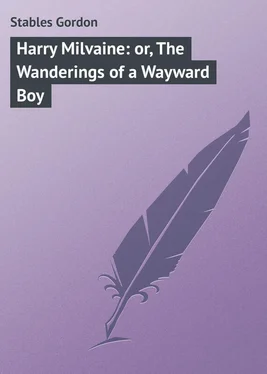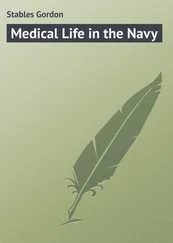Gordon Stables - Harry Milvaine - or, The Wanderings of a Wayward Boy
Здесь есть возможность читать онлайн «Gordon Stables - Harry Milvaine - or, The Wanderings of a Wayward Boy» — ознакомительный отрывок электронной книги совершенно бесплатно, а после прочтения отрывка купить полную версию. В некоторых случаях можно слушать аудио, скачать через торрент в формате fb2 и присутствует краткое содержание. Жанр: foreign_prose, foreign_children, на английском языке. Описание произведения, (предисловие) а так же отзывы посетителей доступны на портале библиотеки ЛибКат.
- Название:Harry Milvaine: or, The Wanderings of a Wayward Boy
- Автор:
- Жанр:
- Год:неизвестен
- ISBN:нет данных
- Рейтинг книги:4 / 5. Голосов: 1
-
Избранное:Добавить в избранное
- Отзывы:
-
Ваша оценка:
- 80
- 1
- 2
- 3
- 4
- 5
Harry Milvaine: or, The Wanderings of a Wayward Boy: краткое содержание, описание и аннотация
Предлагаем к чтению аннотацию, описание, краткое содержание или предисловие (зависит от того, что написал сам автор книги «Harry Milvaine: or, The Wanderings of a Wayward Boy»). Если вы не нашли необходимую информацию о книге — напишите в комментариях, мы постараемся отыскать её.
Harry Milvaine: or, The Wanderings of a Wayward Boy — читать онлайн ознакомительный отрывок
Ниже представлен текст книги, разбитый по страницам. Система сохранения места последней прочитанной страницы, позволяет с удобством читать онлайн бесплатно книгу «Harry Milvaine: or, The Wanderings of a Wayward Boy», без необходимости каждый раз заново искать на чём Вы остановились. Поставьте закладку, и сможете в любой момент перейти на страницу, на которой закончили чтение.
Интервал:
Закладка:
Every time any of Harry’s aunts came they made this remark:
“How the boy does grow, to be sure!” Every time one of Harry’s uncles came he made some such remark as this:
“He’ll be as big a man as his father. He is a true Highlander and a true Milvaine.”
Harry liked his uncles and aunts very well after a fashion, but he cared little or nothing for his cousins. Some of them called him the hermit. Harry did not mind. But he would coolly lock his garden gate and sit down to read or to write, or begin working at his lathe, while his cousins would be playing cricket in the paddock; then perhaps he would come out, look for a moment, with an air of indifference, at the game, then whistle on Eily and go off to the woods or the river. This was exceedingly inhospitable of Harry, I must confess, only I must paint my hero in his true colours.
“Why don’t you play with your cousins, dear?” his mother would ask.
“Oh, mamma!” Harry would reply, “what are they to me? I have books, a gun, and a fishing-rod, and I have Eily; what more should I want?”
The name of Hermit followed him to the parish school. Our tale dates back to the days before School Boards were thought of.
Harry was eleven now, and therefore somewhat too old for a governess. So Miss Campbell had gone. I’m afraid that Harry had already forgotten his promise to marry her when he “grew a great big man.” At all events he did not repeat it even when he kissed her good-bye.
What a long, long walk Harry had to that parish school! How would the average English boy like to trudge o’er hill and dale, through moor and moss and forest, four long miles every morning? But that is precisely what Harry had to do, carrying with him, too, a pile of books one foot high, including a large Latin dictionary.
Harry thought it delightful in summer; he used to start very early so as to be able to study nature by the way, study birds and their nests, study trees and shrubs and ferns and flowers.
Scottish schoolboy fashion, he took his dinner with him. A meagre meal enough, only some bread-and-butter in a little bag, and a tin of sweet milk which he carried in his hand.
Eily always went along with him, but she waited at a neighbouring farm until school came out in the forenoon, when she had part of Harry’s dinner; then she was invariably at the gate at four o’clock, and wild with joy when the homeward journey commenced.
Several other boys went Harry’s road for more than two miles, but it was the custom of the “Hermit” to start off at a race with his dog as soon as he got out, and never halt until he put a good half-mile betwixt himself and the lads, who would gladly have borne him company.
No wonder he was called “Harry the Hermit!”
Dominie Roberts, the parish schoolmaster, was a pedagogue of the old school. And there exist many such in Scotland still.
He would no more think of teaching a class without the tawse in his hand, than a huntsman would of entering the kennels without his whip. As my English readers may not know what a “tawse” is, I herewith give them a recipe for making one.
Take, then, a piece of leather two feet long, and one inch and a half wide. The leather ought to be the thickest a shoemaker can give you, of the same sort as he makes the uppers of a navvy’s boots with. Now at one end make a slit or buttonhole to pass two fingers through, and cut up the other into three tags of equal breadth and about three inches long.
Then your tawse is complete, or will be so as soon as you have heated the ends for a short time in the fire to harden them.
It is a fearful instrument of torture, as my experience can testify. It is not quite so much used in schools now, however, as it was thirty years ago, when the writer was a boy. But it is still used. Such a thing as hoisting and flogging, I do not believe, was ever known in a Scottish school. It would result in mutiny.
You have to hold out your hand. The teacher says “ Pande ” (in Latin). Then he lets you have it again and again, sometimes till he is out of breath, and your hands and wrists are all blistered.
I remember receiving six-and-thirty “pandeys,” because I had smashed a tyrant boy who had bullied me for months. It was a cruel injustice; for the bully got no punishment except that which I had given him.
Dominie Roberts was a pedagogue, then, of this class.
All the boys were afraid of him. Harry was not. Though only eleven years of age, Harry was nearly as tall as the dominie.
There was a consultation one day as to who should steal the tawse.
No boy would venture, but at length —
“I will,” said Harry.
“Hurrah! for the Hermit!” was the shout.
The dominie went out of the schoolroom every forenoon for half an hour to smoke. A pretty hubbub and din there was then, you may be sure.
The day after the theft of the tawse was determined on, as soon as the pedagogue had stumped out of the school – he wore a wooden leg from the knee – Harry went boldly up to the desk and seized the tawse.
“What shall I do with it?” he asked a schoolboy.
“Pitch it out of the window.”
“ No ,” cried another, “he would get it again. Put it in the fire.”
Harry did so, and covered it up with burning coals.
By and by back stumped the dominie. He held his nose in the air and sniffed. There was a shocking smell of burning leather.
The dominie went straight to the fire, and with the poker discovered the almost shapeless cinders of his pet tawse!
He grew red and white, time about, with rage.
“Who has done this thing?” he thundered.
No reply, and the dominie thumped on the floor with his wooden leg, and repeated the question.
Still no answer.
“I shall punish the entire school,” cried Dominie Roberts.
He stumped out again, and many of the boys grew pale with fear, and the smaller ones began to cry.
Presently the dominie returned. In his hand he bore a long piece of a bridle rein, and this he fashioned into a tawse in sight of the whole school. Then he called the biggest class, and once more demanded the name of the culprit.
No reply, but every lad in the class began to wet his hands and pull down his sleeves.
“All hands up,” was the terrible command.
The punishment was about to commence when forth stepped Harry the Hermit into the middle of the circle.
“Stay a moment, if you please, sir,” said Harry.
“You know, then, who committed the crime?” asked the dominie, sternly.
“I do; it was myself.”
“And why?”
“Because the other boys wanted to, but were afraid.”
“Which other boys? Name them.”
“I will not.”
“ Pande , sir, Pande .”
Five minutes afterwards Harry staggered back to his seat, pale-faced and sick.
He sat down beside his class-mate, and was soon so far recovered as to be able to whisper —
“How many did I have?”
“Two-and-twenty,” was the reply. “I counted.”
“And that new tawse is a tickler, I can tell you,” said Harry.
He did not climb any trees that day going home. He could not have held on. Nor was he able to eat much supper, but he did not tell the reason why.
But, apart from his fondness for corporal or palmar punishment, Dominie Roberts was a clever teacher, and Harry made excellent progress.
Autumn came round, and stormy wet days, and many a cold drenching our hero got, both coming to and going from school. But he did not mind them. They only seemed to render him hardier and sturdier, and make his cheeks the ruddier.
Then winter arrived “on his snow-white car,” as poets say, and often such storms blew that even grown-up people feared to face them. But Harry would not give in. On evenings like these John would be dispatched to meet Harry, and many an anxious glance from the dining-room window would his mother cast, until she saw them coming up the long avenue, Eily always first, feathering through the snow, and barking for very joy as she neared the house.
Читать дальшеИнтервал:
Закладка:
Похожие книги на «Harry Milvaine: or, The Wanderings of a Wayward Boy»
Представляем Вашему вниманию похожие книги на «Harry Milvaine: or, The Wanderings of a Wayward Boy» списком для выбора. Мы отобрали схожую по названию и смыслу литературу в надежде предоставить читателям больше вариантов отыскать новые, интересные, ещё непрочитанные произведения.
Обсуждение, отзывы о книге «Harry Milvaine: or, The Wanderings of a Wayward Boy» и просто собственные мнения читателей. Оставьте ваши комментарии, напишите, что Вы думаете о произведении, его смысле или главных героях. Укажите что конкретно понравилось, а что нет, и почему Вы так считаете.












